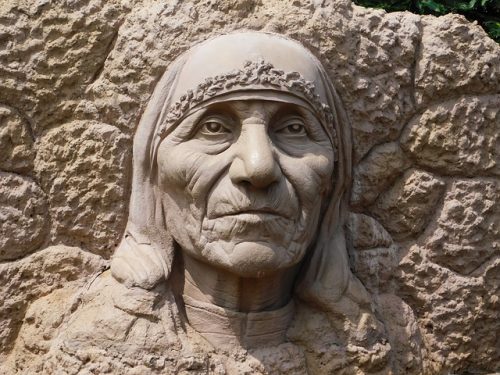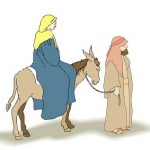Life is full of special times and occasions.
Life would be empty without special events to celebrate: Engagements, marriages, baby births, birthdays, graduations, anniversaries, etc.
But life also has its setbacks that cause one to feel empty: Physical handicaps, debilitating diseases, marriage breakups, and death amongst a host of other problems.
In this session, we’re going to briefly look at an occasion when Jesus converted an apparent setback into a miracle
Read the story in Matthew 14:13-21.

Photo by Leah Kelley:
EMPTY FEELINGS
We all experience those times when, because of circumstances, life seems to be empty and meaningless.
- What emptiness have you been experiencing lately?
- Some may have lost loved ones. A brother or sister, a parent or child, a spouse or some other beloved family member or friend. The emptiness left by the one who has gone is traumatic.
I lost Arthur, my only brother, to cancer on 23rd December several years back. Christmas still holds an element of sadness for my wife, Shirl, and me. It’s hard, isn’t it? People try to comfort and say, “He/she has gone to a better place.” That’s true – but Arthur didn’t take me with him. He is no longer a part of my life and I miss him.
- Many of you have had to say goodbye to your children as they’ve left the nest.
Shirl and I will never forget the day we said goodbye to our daughter Debbie who, with her husband Craig and two small children, took off for the mission field in Venezuela. That was hard. Knowing that it was right because it was the Lord’s will, didn’t make it any easier for us. We still felt that feeling of loss.
- Perhaps severe illness has brought about emptiness in your life. You can’t do what you used to do before.
- Some may be experiencing the emptiness of a broken relationship. Perhaps your marriage partner or the love of your life found someone else to love.
FAMISHED CROWDS
In today’s passage we encounter another form of emptiness caused by being without food for a long period.
It had been a long tiring day and it was getting late. Jesus’s disciples tried to persuade Him to send the people off to the villages to buy food. Jesus responded, “You give them something to eat. (Matthew 14:16 NIV) Five thousand people and Jesus expected the disciples to feed them all. Come on!
“But Master all we can muster is five loaves of bread and two fish. That will never feed this crowd.”
“Bring them here to me.” (Verse 17) Jesus said, “Bring me what you’ve got.”
The disciples could have reacted, “Forget it! No way. We’re not going to look like fools. We don’t have anything like enough food.” Then the crowds would have gone home hungry. And the disciples would never have witnessed an amazing miracle.
Jesus went on to feed that massive crowd of five thousand from the very tiny offering the disciples had to offer.
We all go through periods when we feel that we have nothing to offer, don’t we? Times when we feel empty—drained of joy, enthusiasm, strength. Empty. So what does He want us to do?
OFFER WHAT YOU HAVE
He asks us to bring Him what we have.
All the disciples could muster was in effect one person’s picnic lunch. John tells us that it was a lad’s lunch (John 6:9). Yet from it Jesus fed that massive crowd, with leftovers.
Have you ever stopped to wonder why Jesus over-catered?
Paul tells us that Jesus loves to do – far more than you could ever imagine or guess or request in your wildest dreams! (Ephesians 3:20a – The Message)
The disciples only had “five small barley loaves and two small fish’ (John 6:9 NIV). Jesus not only fed the crowd of 5000 men (not counting the women and kids!) yet there were twelve baskets of left-overs.
Why?? Far more than we dare ask or imagine. (Ephesians 3:20 CEV)
FEELING EMPTY?
What area of your life feels empty today?
What can you bring to Him so that He can use it to work a miracle in your life?
- Do you have an empty home?
- Is your life lacking companionship?
- Do you have lots of love to share but no-one to share it with?
- Have you got time on your hands—through illness, or bereavement?
The disciples had no clue how Jesus would feed that large crowd with five small loaves and two tiny fish, but He used what they gave Him.
His (Jesus's) power at work in us can do far more than we dare ask or imagine. Ephesians 3:20b CEV Click To Tweet
You may not know what Jesus can do in your life. But if you don’t offer Him what you have, you may never know.
As we bring this session to a close, whatever the cause of your emptiness bring it to Jesus. Bring Him whatever you have, whatever you’re capable of doing.
Do what He shows you and may you experience many happy surprises seeing Him by means of his power working in you … do so much more than you can ever ask for, or even think of (Ephesians 3:20 GNB).
May you experience the joy of seeing how He uses what you offer Him in an amazing way. He may not do as you expect; He rarely does. But give Him what you have anyway.
Listen to this beautiful rendition of Give Them All by the Gaither Group.
If you haven’t yet read the Introduction to Encounters with Jesus, please do. It will benefit you throughout this series of studies.





















